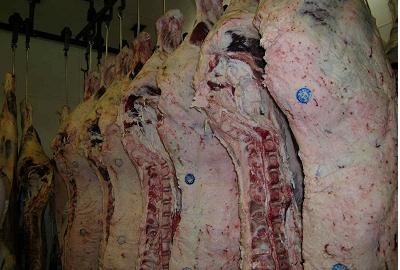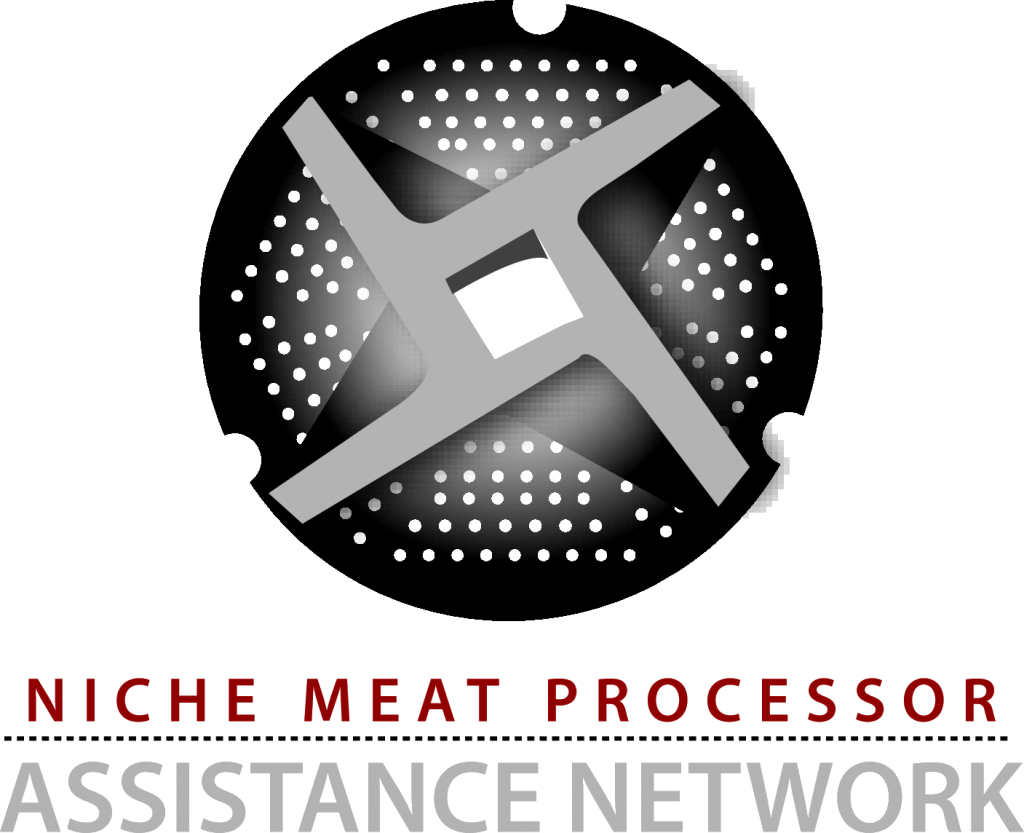Niche Meat Processor Case Studies
The following case studies offer a detailed look inside a variety of niche-oriented meat processors. Some have photos, design drawings, and even videos. The processors gave generously of their time and information so that we could share their stories with you.
Fixed Facilities
Foothills Local Meat/Butcher Bars (April 2018)
Asheville & Black Mountain, NC: Foothills Meats is a retail exempt food-service company specializing in local and pasture-raised meats for retail and wholesale markets in the mountainous Western North Carolina region. The core of their business is their food-service arm, which consists of permanent food truck, open daily at Hi-Wire Brewing’s Big Top, two new neighborhood Butcher Bar eateries, and their Catering Division, which offers a wide range of menu options for weddings and events of all sizes. Foothills also offers custom butchery, fabrication, sausages and primal cuts for wholesale buyers and home-use. Foothills meats can be purchased in bulk or bi-weekly through their Meat Share CSA program.
LPCA Plant: Odessa, WA (April 2017)
Odessa, Washington: The Livestock Producers Cooperative Association (LPCA) is a multi-species, cooperatively-owned meat processing plant in Odessa, Washington, located near the center of the state. It was formed primarily by cattle producers involved in the Cattle Producers of Washington (CPoW) but will process sheep, goats, pigs, and bison as well. They are a USDA-inspected slaughter and fabrication facility.
Smuckers Meats (updated)
Mount Joy, Pennsylvania: Smucker’s Meats is a family-owned, USDA-inspected slaughter, fabrication, and further-processing plant for red meat. The core of their business is processing locally grown livestock that are sustainably raised. Their services are in high demand — they are typically scheduled out 3-4 months. They process an average of ~45 head of beef and 5-10 hogs each week.
Lorentz Meats
Cannon Falls, Minnesota: Lorentz Meats is a USDA-inspected slaughter, fabrication, and value-added processing plant for beef and bison. They handle more than 8000 head per year, on a fee-for-service basis for niche meat brands and independent farmers. The business has been in the family since 1968.
Heritage Meats
Rochester, Washington: Heritage Meats is a small, USDA-inspected cut and wrap facility that provides fee-for-service processing of all red meat species for independent farmer-marketers and retail butcher shops. The plant has a custom-exempt side for freezer-beef customers. They are a primary processor for the region’s USDA inspected mobile slaughter unit.
TFC Poultry Processing
Ashby, Minnesota: TFC is a USDA-inspected poultry processor that provides fee-for-service processing for small-scale, local farmers and two organic meat companies. The majority of their throughput is spent hens from a variety of sources. Their motto is “big enough to do things, small enough to cater.”
White Oak Pastures
Bluffton, GA: White Oak Pastures is a family owned, vertically integrated, grass-fed meat company with two on-farm slaughter and processing plants, one for poultry and one for cattle, sheep, and goats. Both are Talmadge-Aiken plants. All meat and poultry processed are sold under the White Oak Pastures label.
Ranch Foods Direct
Colorado Springs, CO: Ranch Foods Direct is a USDA-inspected processor and retail food company that does cutting, packaging, and some value-added processing. RFD primarily processes cattle for its own house brand of beef but also provides processing services on a fee-for-service basis for ranchers who market their own meats independently. RFD also operates a USDA-inspected mobile slaughter unit in Kansas.
Midwestern Country Locker
Midwest: This case study details an small, locker-type plant from the Midwest (the owners wish to remain anonymous). The facility has been in continuous operation since 1939, and the current owner is looking to build a new facility. Though the plant is state-inspected for hog slaughter and for processing, their work is 90+% custom uninspected, and they offer a wide variety of ready-to-eat products. The plant processes an average of 11 beef a week and 15 hogs, plus a large volume of deer in the fall and winter.
Good Natured Family Farms
Uniontown, Kansas: The plant processes meat for the Good Natured Family Farms brand, distributed regionally around Kansas City, Missouri. Although the plant is owned by one farm, the meat processed there comes from regional farms and the policies and practices are designed to serve the needs of local farmers. Good Natured Family Farms is a model of responsible vertical integration: The company founders operate a working farm, a meat processing plant, a food distribution company, steward the Good Natured Family Farms brand, and organize of a farmer-owned all-natural beef co-op. This plant processes 8-10 head of cattle or 300 chickens per day and is USDA inspected.
Harvey, North Dakota, USDA Slaughter and Processing Plant (updated)
Harvey, North Dakota: A cautionary tale, this is a three part story about one USDA inspected slaughter & processing plant, first conceived in 1999, opened in 2001, failed & reborn twice, and closed in August 2008 (though it may be opened yet again, by a new operator).
Sioux-Preme Packing Company
Sioux City, Iowa: In 1970, Sioux-Preme started out as a harvest-only facility, in a “hog-rich” part of Sioux County, and expanded to fabrication in the early 1990s. When the company began, in the mid-90s, to look for a differentiation strategy, it found that opportunity in niche pork processing. Today its customers include Niman Ranch, Beeler’s Natural, Organic Valley, and others. Sioux-Preme is large enough to handle significant volume but small and flexible enough to meet customer needs in a dynamic, diversified marketplace.
Acre Station Meat Farm (updated)
Pinetown, North Carolina: Built in 1978, Acre Station Meat Farm combines a processing facility and a retail grocery store. As the only small meatpacker in the state able to produce a range of value-added products, such as bacon and ham, they have become the “go-to” processor for a number of the state’s independent farmers direct marketing their own meats. Acre Station also works closely with stakeholders in the state who are establishing connections between local independent farmers and local retail markets.
Mobile Units
Island Grown Farmers Cooperative (updated)
Bow, Washington: The Island Grown Farmers Cooperative (IGFC) mobile processing unit (MPU) was the first USDA-inspected mobile slaughter facility for red meat in the U.S. Further processing is done at a permanent plant in Bow, WA, also USDA-inspected. The MPU can process 9-10 head beef (or 40 sheep or 24 pigs) each day, 3-4 days a week. In 2007, the IGFC MPU and processing facility handled 308,000 lbs of meat for its members and has stayed at that capacity since then.
Kentucky Mobile Poultry Processing Unit (updated)
Frankfort, Kentucky: This small, mobile poultry processing unit was built in Kentucky in 2001 by Heifer International with Kentucky State University (KSU), Partners for Family Farms (PFF), and the National Center for Appropriate Technology (NCAT). State-approved but uninspected, the MPU is owned and maintained by KSU. Farmers use it on a rental basis to process poultry and aquaculture.
Coast Grown Mobile Harvest Unit (updated)
Central Coast Region, California: This mobile unit was built in 2002 by ranchers who wanted better access to an inspected slaughter facility. Regulatory complexities paired with uncertain markets kept it parked for seven years. In 2009, it finally began operations as a USDA inspected unit. This case study, written after the first few months, describes the long and often confusing path to getting it up and running, and the plan for its future success.
Hudson Valley Poultry Processing
Hudson Valley, New York: Hudson Valley Poultry Processing Inc. owns the first state-inspected, enclosed, mobile poultry processing unit (MPPU) operating in New York State, approved in November 2009. Owner Ed Leonardi, a small livestock producer in the Catskills, designed it to allow other producers to process their own birds under their own state (5A) license.
Tangletown Farm Poultry Processing (updated)
Middlesex, Vermont: Tangletown Farm in Vermont, owns and operates a mobile poultry processing unit under state inspection. The unit was originally built as a prototype by the state of Vermont in 2008. Operator George Eisenhardt brought a lifetime of experience in the slaughterhouse business when he started using the MPPU in August 2009. It was sold to Tangletown Farm in January 2012- they currently use it to process their own poultry only.
Puget Sound Meat Producers Cooperative (updated)
Tacoma, Washington: The PSMPC is a non-profit cooperative of local ranchers, farmers, butchers, restaurant owners, and others who jointly operate a mobile, USDA-inspected slaughter unit. It initially services King, Kitsap, Lewis, Mason, Pierce, and Thurston counties. The MSU is owned by the Pierce Conservation District; PSMPC leases it. The first animals were slaughtered in the unit in October 2009.



